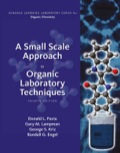
EBK A SMALL SCALE APPROACH TO ORGANIC L
4th Edition
ISBN: 9781305446021
Author: Lampman
Publisher: CENGAGE LEARNING - CONSIGNMENT
expand_more
expand_more
format_list_bulleted
Concept explainers
Question
Chapter 19, Problem 5Q
Interpretation Introduction
Interpretation:
The reason for bromocyclopentaneto be more reactive than bromocyclohexane when heated with sodium iodide in acetone needs to be explained.
Concept Introduction:
Here HX can be HCl or
Expert Solution & Answer
Trending nowThis is a popular solution!

Students have asked these similar questions
Bromocyclopentane is more reactive than bromocyclohexane when heated with sodium iodide in acetone. Explain this difference in reactivity.
Why is enol formation in dimedone more favorable than in cyclohexanone?
Dehydrohalogenation of 1-chloro-1-methylcyclopropane affords two alkenes (A and B) as products. Explain why A is the major product despite the fact that it contains the less substituted double bond.
Chapter 19 Solutions
EBK A SMALL SCALE APPROACH TO ORGANIC L
Knowledge Booster
Learn more about
Need a deep-dive on the concept behind this application? Look no further. Learn more about this topic, chemistry and related others by exploring similar questions and additional content below.Similar questions
- How many different monosubstituted products are possible when ethylcyclopentane reacts with one equivalent of bromine in the presence of light?arrow_forwardCyclobutane fracts with bromine to give bromocyclobutane, but bicyclobutane reacts with bromine to give 1,3-dibromocyclobutane. Account for the differences between the reactions of thee two compounds.arrow_forwardAccount for the stereoselectivity and regioselectivity of the three steps in the conversion of compound C to compound F.arrow_forward
- Which stereoisomer of 3-hexene forms (3S,4S)-4-bromo-3-hexanol and (3R,4R)-4-bromo-3-hexanol when it reacts with Br2 and H2O?arrow_forwardexplain why homolysis of the O-H bond in phenol requires considerably less energy than homolysis of the O-H bond in ethanolarrow_forwardExplain this observation: Ethyl 3-phenylpropanoate (C6H5CH2CH2CO2CH2CH3) reacts with electrophiles to afford ortho- and para-disubstituted arenes, but ethyl 3-phenylprop-2-enoate (C6H5CH=CHCO2CH2CH3) reacts with electrophiles to afford meta- disubstituted arenes.arrow_forward
- Explain why the ether obtained by treating an optically active alcohol with PBr3 in pyridine followed by sodium methoxide has the same configuration as the alcohol, whereas the ether obtained by treating the alcohol with tosyl chloride followed by sodium methoxide has a configuration opposite that of the alcohol.arrow_forwardExplain why fluorobenzene is more reactive than chlorobenzene toward electrophilic aromatic substitution but chloromethylbenzene is more reactive than fluoromethylbenzene.arrow_forwardWhen sodium methoxide base and hydrogen bromide are removed from trans-1-bromo 2-methyl cyclohexane, considering the conformation of the starting compound, find the product that will be formed by writing and explaining the mechanism of the reaction.arrow_forward
- Acid catalyzed dehydration reaction of 2-methyl-1-butanol produces 2-methyl-2-butene as the major product. Also acid catalyzed dehydration reaction of 3-methyl-1-butanol give the same product as major product. Explain the reason why both of the reaction produce the same product as the major product.arrow_forwardWhat is the major monosubstitution product from the Friedel—Crafts reaction of benzene with 1 -chloro-2-methylpropane in the presence of AlCl3?arrow_forward-Ocimene is a pleasant-smelling hydrocarbon found in the leaves of certain herbs. It has the molecular formula C10H16 and a UV absorption maximum at 232 nm. On hydrogenation with a palladium catalyst, 2,6-dimethyloctane is obtained. Ozonolysis of -ocimene, followed by treatment with zinc and acetic acid, produces the following four fragments: (a) How many double bonds does -ocimene have? (b) Is -ocimene conjugated or nonconjugated? (c) Propose a structure for -ocimene. (d) Write the reactions, showing starting material and products.arrow_forward
arrow_back_ios
arrow_forward_ios
Recommended textbooks for you
 EBK A SMALL SCALE APPROACH TO ORGANIC LChemistryISBN:9781305446021Author:LampmanPublisher:CENGAGE LEARNING - CONSIGNMENT
EBK A SMALL SCALE APPROACH TO ORGANIC LChemistryISBN:9781305446021Author:LampmanPublisher:CENGAGE LEARNING - CONSIGNMENT
 Organic ChemistryChemistryISBN:9781305580350Author:William H. Brown, Brent L. Iverson, Eric Anslyn, Christopher S. FootePublisher:Cengage Learning
Organic ChemistryChemistryISBN:9781305580350Author:William H. Brown, Brent L. Iverson, Eric Anslyn, Christopher S. FootePublisher:Cengage Learning

EBK A SMALL SCALE APPROACH TO ORGANIC L
Chemistry
ISBN:9781305446021
Author:Lampman
Publisher:CENGAGE LEARNING - CONSIGNMENT


Organic Chemistry
Chemistry
ISBN:9781305580350
Author:William H. Brown, Brent L. Iverson, Eric Anslyn, Christopher S. Foote
Publisher:Cengage Learning
Alcohols, Ethers, and Epoxides: Crash Course Organic Chemistry #24; Author: Crash Course;https://www.youtube.com/watch?v=j04zMFwDeDU;License: Standard YouTube License, CC-BY